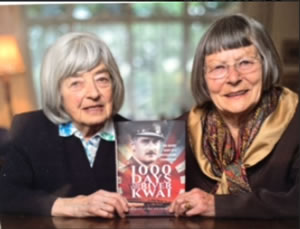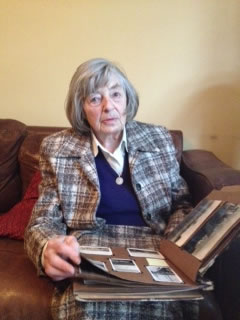The Secret Wartime Diary of A POW Camp Commandant
Chiswick 'Bletchley Girl' Pat Davies on bringing her father's memoir to publication
|
Chiswick resident Pat Davies, whose story as a wartime cipher featured in The Bletchley Girls book, has brought another family member into the public arena with the publication of her father's wartime memoir.
Pat and her sister Jean Argles have collaborated on 1,000 Days On the River Kwai, the story of their father , Colonel Cary Owtram OBE, who kept a secret diary during his years as camp Commandant at Chungkai. The infamous camp was one of the largest POW camps during the Japanese occupation and the construction of the infamous Burma Railway during which several thousands British and Allied prisoners died.

Pat (on the left) was one of thousands of women whose role in the war was only recently recognised. Her story is featured in The Bletchley Girls, which documents the lives of fifteen women who worked at Bletchley Park - it is thought that up to 7,000 women known as Bletchleyettes, worked at the secret codebreaking HQ during the war.

Pat Davies recalls her life during the Second World War
Pat, who is 93, is originally from Lancashire, said she and her brother and sister discovered that their father Colonel Cary Owtram OBE had kept a secret diary during his incarceration in the camp. This is now with the Imperial War Museum. After being captured in Singapore, and transported to the infamous Burma Railway, he was appointed the British Camp Commandant at Chungkai, one of the largest POW camps.
Many ex-prisoners testified to the mental and physical courage shown by Col Owtram protecting prisoners from the worst excesses of their captors.
During his time away, the family had little contact or news about his wellbeing. When he returned after the war, he appeared in good spirits but never spoke about his time away. He looked thin but cheerful and had brought them all presents from Rangoon, "just as if he had been away on holiday", she says. He did, however, harbour a hatred for all things Japanese for the rest of his life.
In the 1960s Pat visited the area, as a BBC television producer. She saw the Memorial to those who died in the camp, with 'Thou Name Liveth' inscribed, but said the camp itself had reverted back to nature, overgrown and abandoned. "You wouldn't have known anything about what happened there it was very peaceful surrounded by hills." There she met the local merchant Boon Pong, who had taken great risks to supply the Allied prisoners with medicines and wireless batteries, and he showed her around the area and recalled her father.
While Pat's father never spoke about his experience, the family discovered that when he had an operation, he woke from the anaesthetic thinking he was back in Chungkai.
Colonel Cary Owtram was educated at Shrewsbury School before he was commissioned into the Royal Marine Artillery in 1917. in 1939 he was Second in Command of 137 Field Regiment when he had to take over the regiment because the commanding officer was killed.
After the war, he became High Sheriff of Lancashire, a Deputy Lieutenant of the County, a JP, and was involved in the local mills and agriculture. He died in 1993.
His two daughters recall their father's lively personality when as children he would lead family singsongs, act in local dramatic productions and show a great concern for the welfare of the workers in the family cotton mills.
"Our father had very much wanted his diary to be published, both as a record of what happened in the camps and to commemorate the many Allied soldiers who died there. It wasn't published in his lifetime and we are so glad it is being published now."
1,000 Days On the River Kwai (published by Pen & Sword, at £19.99) will be on sale in Waterstones in Chiswick.
May 22, 2017